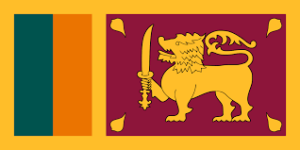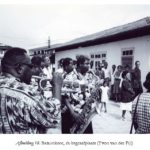Sri Lanka’s National People’s Power Sweeps General Election
No Comments yet 11-17-2024 ~ On October 15, data from the Election Commission of Sri Lanka showed that the National People’s Power (NPP) coalition scored a decisive victory in Sri Lanka’s first general election since defaulting on its external debt.
11-17-2024 ~ On October 15, data from the Election Commission of Sri Lanka showed that the National People’s Power (NPP) coalition scored a decisive victory in Sri Lanka’s first general election since defaulting on its external debt.
With 61.56 percent of the popular vote, the NPP won 159 seats in Parliament. This gave President Anura Kumara Dissanayake (AKD) a supermajority in parliament and the power to make constitutional amendments.
The NPP won a majority of the popular vote in 21 out of 22 electoral districts in the country. In the southern district of Hambantota, a traditionally left-wing Sinhala nationalist constituency that was the stronghold of the Rajapaksa family, the NPP secured 66.38 percent of the vote.
In the central Nuwaraeliya district, where many of the voters are Tamil-speaking workers in tea estates, the NPP secured a 41.57 percent plurality of the vote. In the northern Jaffna district, a stronghold of conservative Tamil nationalist parties, the NPP secured a plurality, with 24.85 percent of the popular vote.
This is a significant turnaround for the NPP, as during the presidential election, AKD polled poorly in both the north and in the central tea estate regions.
These developments may indicate that traditional identity-based parties are undergoing a significant crisis of legitimacy, as economic grievances and bitterness toward the established political elite take center stage.
They also indicate the success of the NPP in driving a grassroots campaign that emphasized national unity, or in their words, “a national renaissance.”
Several parliamentarians who were a mainstay in electoral politics for decades lost their seats entirely. The disintegration of the two great poles of Sri Lankan electoral politics—the center-right United National Party (UNP) and its breakaway Samagi Jana Balawegaya (SJB), and the center-left Sri Lanka Freedom Party (SLFP) and its breakaway Sri Lanka Podujana Peramuna (SLPP)—continued.
Sajith Premadasa’s SJB, with just 17.66 percent of the vote, will sit in opposition. Namal Rajapaksa’s SLPP secured just 3.14 percent of the vote. Ranil Wickremesinghe’s new alliance, the New Democratic Front, secured just 4.49 percent of the vote.
Importantly, voter turnout declined from 79.46 percent in the September presidential election to 68.93 percent—the lowest turnout for an election since 2010. This likely played some role in boosting pro-incumbent bias as disenchanted voters of parties other than the NPP chose to stay at home.
Challenges Ahead
In the realm of economic policy, the new NPP government is sitting on the ticking time bomb that is Sri Lanka’s 17th IMF program and its accompanying debt restructuring deal, sealed by AKD’s predecessor Ranil Wickremesinghe. One of AKD’s key campaign promises was to conduct an independent debt sustainability analysis and renegotiate this deal. This will be much easier said than done.
The debt restructuring deal negotiated by Wickremesinghe includes novel instruments such as “governance-linked bonds” which link interest rates to the government’s willingness to pass “anti-corruption” legislation—corruption being a dog whistle reserved for countries in the Global South that are insufficiently subordinated to the neoliberal paradigm.
The deal also includes “macro-linked bonds” which have no upside for Sri Lanka. According to these, higher GDP growth rates in the country will be met with higher interest payments to private bondholders, like BlackRock, who own the largest share of Sri Lanka’s debt.
Some analysts predict an economic meltdown starting in 2027 when Sri Lanka will have to begin repaying its external debt, likely running down its foreign currency reserves and forcing it to borrow again from international bond markets. In order to deliver on its campaign promise of system change, the NPP will have to put an end to this debt spiral and begin to industrialize the country.
In the realm of foreign policy, the NPP will have to navigate the recently elected Trump administration, which is likely to double down on the Indo-Pacific Strategy to contain China. Following the end of Sri Lanka’s Civil War in 2009, the U.S. has applied increasing pressure on the country, often leveraging human rights issues to push through a combination of economic and governance reforms.
In the past decade, the U.S. has attempted to push through economic agreements like the Millennium Challenge Compact which contained provisions to privatize land. It has also promoted military agreements like the Status of Forces Agreement and the Acquisition and Cross-Servicing Agreement, both of which aimed to improve interoperability between the U.S. and Sri Lankan military in order to draw the latter into the United States’ New Cold War on China.
Should it choose to take on these tasks, the NPP will have to tap into the insurgent multipolar movement in the Global South in order to build a united front against debt and imperialism. They will need to rekindle the Bandung Spirit and restore Sri Lanka’s leading position in the Non-Aligned Movement. Time will tell if the NPP is up to this task.
Internal Contradictions
A decisive factor in the next four years will be how the internal balance of forces plays out within the NPP coalition, where the biggest party is the Janatha Vimukthi Peramuna (JVP). Many of the NPP’s new parliamentarians are young and inexperienced and have few links with the old JVP. The latter was modeled on a Marxist-Leninist cadre-based party.
The ideological makeup of the NPP is therefore eclectic, including many middle-class professionals, academics, artists, and political activists. Some have a markedly liberal cosmopolitan character that is in stark contrast to the old JVP’s base of mainly rural cadres known for their militancy and patriotism. Managing this dialectic of old and new will be another challenge for AKD.
Meanwhile, the shock of an electoral wipe may force the right-wing forces, namely the UNP and SJB, to regroup. They will take every opportunity to evoke a red scare and paint even the most moderate reform as a communist takeover. They will use their links with imperialists in the West to do this.
Finally, there is the traditional nationalist camp which includes the Rajapaksas, various splinters of the Old Left, and Sinhala nationalists. It is clear that it is primarily the disenchanted voters of this bloc that form the bedrock of support for the NPP. Therefore, there will likely be much pressure on the NPP to live up to the populist and patriotic traditions of southern Sri Lanka.
By Shiran Illanperuma
Author Bio: This article was produced by Globetrotter. Shiran Illanperuma is a Sri Lankan political economist and writer. He is a researcher and editor at Tricontinental: Institute for Social Research. He holds an MSc in economic policy from SOAS University of London. His research interests include industrial policy and structural transformation.
Source: Globetrotter
You May Also Like
Comments
Leave a Reply







